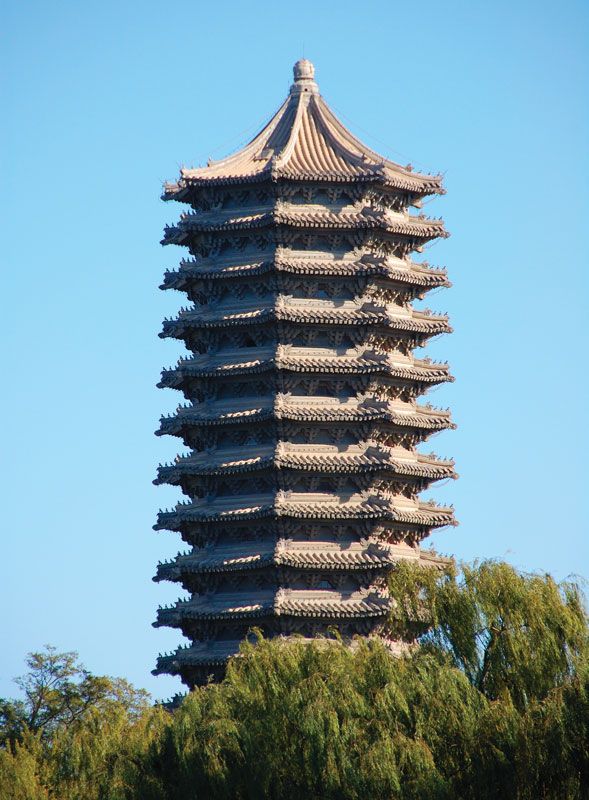


In a recent ranking of universities in Asia, China's Peking University was named the best university in the region, followed by the University of Hong Kong and the National University of Singapore. On the other hand, India's IIT Delhi and IIT Bombay secured the top two spots among Indian universities, while five other Indian institutes made it into the top 100 list. With China dominating the top rankings, the competition for the best universities in Asia continues to grow.
Asia's Educational Landscape: Peking University Tops QS Rankings
In a recent ranking of universities in Asia, China's Peking University has emerged as the undisputed leader, dethroning the National University of Singapore (NUS), which had held the top spot for four consecutive years. The QS World University Rankings Asia 2023 placed Peking University first, followed by NUS in second and the University of Hong Kong (HKU) in third.
China Dominates Top Rankings
China's dominance in the top rankings is evident with three of its universities securing positions in the top five. Tsinghua University climbed to fourth place, while Fudan University retained its fifth position. This dominance reflects China's significant investment in higher education and its focus on research and innovation.
India's Stellar Performance
Despite China's strong showing, India's top universities have also performed exceptionally well. The Indian Institute of Technology (IIT) Delhi and IIT Bombay secured the top two spots among Indian universities, with IIT Madras, IIT Kharagpur, and IIT Kanpur also making it into the top 100 list. This achievement highlights India's growing prominence as a global hub for education and research.
Competition for Excellence
The competition for the best universities in Asia continues to intensify. With China and India leading the charge, other countries in the region are also striving to improve their educational standards. This competition has led to increased collaboration between universities and the establishment of new research centers and international partnerships.
Top 5 FAQs
1. Why has Peking University ranked first in the QS Rankings Asia 2023?
Peking University has excelled in several key areas, including academic reputation, employer reputation, faculty-student ratio, and citations per faculty. Its strong performance in these indicators has contributed to its top ranking.
2. What is the significance of India's universities performing well in the rankings?
India's top universities' strong performance reflects the country's growing investment in higher education and its commitment to fostering research and innovation. These universities are playing a pivotal role in shaping India's future and enhancing its competitiveness on the global stage.
3. How can Asian universities improve their rankings?
Asian universities can improve their rankings by focusing on research excellence, attracting top faculty and students, enhancing international partnerships, and fostering a collaborative and innovative environment. Continued investment in education and research is also crucial.
4. What are the trends in higher education in Asia?
Emerging trends in higher education in Asia include an increased focus on STEM fields, interdisciplinary research, and collaboration between universities and industry. Digitalization and online learning are also gaining prominence.
5. What challenges do universities in Asia face?
Universities in Asia face challenges such as funding constraints, political interference, and the need to adapt to rapidly changing economic and technological landscapes. They also need to address issues of access and equity to ensure that all students have equal opportunities for higher education.

Four people have died and 11 have been injured after a UPS cargo plane crashed near Louisville Muhammad Ali International Airport in Kentucky. All flights in and out of the airport have been suspended as police and emergency services are attending the scene. Kentucky governor Andy Beshear has described the accident as "catastrophic" and is urging residents to obey any shelter-in-place orders.

Eight people have been killed and numerous others injured after a passenger train collided with a goods train in Chhattisgarh. The accident occurred in the afternoon, halting train services on the route and prompting the cancellation or diversion of multiple trains. Emergency teams have been dispatched to the scene, with rescue operations ongoing and medical treatment being provided to the injured passengers. Helpline numbers have been issued for convenience, and the railway authorities have assured that all efforts are being made to assist those affected by the tragedy.

Today, 5 November 2025, marks the 556th birth anniversary of Guru Nanak Dev Ji, the founder of Sikhism. As we celebrate this sacred and highly revered festival, let us remember and spread the teachings of Guru Nanak Dev Ji, which promote compassion, humility, and love for all. To commemorate this occasion, indianexpress.com has compiled heartfelt wishes and messages to share with friends and family, wishing everyone endless happiness, peace, and prosperity.

During the Emerging Science Technology and Innovation Conclave, PM Modi announced the launch of the Rs 1 lakh crore Research, Development and Innovation Fund. This fund, under the Department of Science and Technology, aims to encourage private sector investments in R&D to drive India's vision of becoming an innovation-driven nation. With this fund, India's R&D expenditure has doubled in the last decade and the country now has the world's third-largest startup ecosystem. PM Modi also highlighted how India's domestic capability has accelerated during the COVID-19 pandemic due to its successful digital public infrastructure.

A stampede at the Kasibugga Venkateswara Swamy Temple in Andhra Pradesh has left 10 dead and two injured. The temple had recently reopened and was experiencing high footfall due to a festival. Home Minister Vangalapudi Anitha has ordered a thorough investigation into the causes of the tragedy and has promised strict measures to prevent similar incidents in the future.

India and the United States have strengthened their already strong ties by signing a 10-year framework for their major defense partnership. The agreement, signed during a bilateral meeting between the two countries' defense ministers, emphasizes the importance of this partnership in maintaining a free and open Indo-Pacific region. This marks a significant step in solidifying the bond between India and the US in the defense sector.

In preparation for a major tri-service military drill, India has issued Notices to Airmen (NOTAM) for the entire northeastern region that borders China, Bhutan, Myanmar, and Bangladesh. The first set of exercises will commence in November and continue through January, signaling enhanced operational readiness for the Indian Air Force (IAF). This move is significant as the Northeast remains a sensitive theater, making up the boundary with four countries, including China. The upcoming IAF exercises aim to strengthen India's air dominance, effectively preparing for any potential challenges along the western frontier with Pakistan.

India will conduct a 10-day military exercise in Rajasthan and Gujarat involving the Army, Air Force, and Navy to showcase its operational readiness following Operation Sindoor earlier this year. The exercise, announced through a NOTAM, features advanced military technologies and emphasises the integration of speed, firepower, and precision in desert warfare conditions. It comes amidst heightened tensions with Pakistan and a renewed focus on maintaining military readiness along the border.

Jammu and Kashmir police have filed an FIR against a group of Christian missionaries in Kathua district for allegedly attempting religious conversions through financial incentives. This comes after a video surfaced online showing the missionaries being attacked and their vehicle vandalized by villagers. The incident has sparked outrage and protests from local Hindu groups, demanding action against the accused missionaries. One accused, Ravindra Singh Thela, has been arrested while the main accused, Vivek Soni, is still at large. The police have also suspended eight personnel for failing to stop the attack.

US Vice President JD Vance, who converted to Catholicism in 2019, has revealed that he hopes his Hindu-raised wife, Usha Vance, will eventually embrace Christianity. However, he clarifies that their interfaith marriage is built on mutual respect and understanding, and that Usha has complete freedom of choice in matters of faith. The couple has found a balanced way to manage their interfaith household, with their children attending a Christian school and given the choice to be baptized.